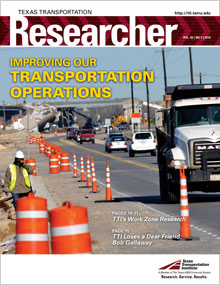
In a classic line from the movie Back to the Future, as Doc Brown’s DeLorean flies off in search of a sequel, the eccentric scientist famously says, “Where we’re going, we don’t need roads.”
But flying cars aren’t here yet, despite promises from actual scientists as far back as the 1950s. We still need roads. And someone has to pay for them.
Therein lies the challenge. Highways are largely funded by the fuel tax, which every consumer pays on every gallon of gas they pump. But as fuel prices and vehicle fuel efficiencies increase, fuel consumption (and thus tax revenues generated by it) are expected to drop by 20 percent by 2025.
“At best, the fuel tax is a proxy for road use,” explains Ginger Goodin, senior research engineer and program manager for the Texas Transportation Institute’s (TTI‘s) Austin Office. “With the expected growth in alternative-fuel vehicles, the state will ultimately need something more equitable and sustainable to fund maintenance of its transportation system.”
Goodin led a project for TTI‘s University Transportation Center for Mobility to examine the mileage-based user fee as an alternative to the fuel tax. A mileage-based user fee is collected for every mile driven on the roadway network. Since it more accurately reflects road usage, the fee could more reliably fund maintenance and expansion of Texas roads.
“Texas’ 2030 Committee estimates a $350 billion funding gap over the next 20 years if the state relies solely on the fuel tax to fund transportation,” says Goodin. “The mileage-based user fee is only one of many solutions that might help to close that gap.”
Building on earlier research, the project identified available technologies to support implementing a regional mileage-based user fee system. Researchers looked at similar fee systems that have been studied domestically or implemented internationally. They also researched various interstate fee-coordination and information-sharing efforts to gather lessons learned should Texas decide to implement a similar system.
A symposium held April 14-15, 2009, in Austin brought together 80 professionals to share information regarding mileage-based user fees. Panel discussions addressed legislative and policy issues, public acceptance challenges, potential technology applications and institutional issues.
“The Lone Star State is lucky to have TTI, one of the few research agencies in the United States with the technical expertise necessary to thoroughly assess alternatives to the fuel tax,” says James Whitty, manager of the Oregon Department of Transportation’s Office of Innovative Partnerships and Alternative Funding. Whitty is a nationally recognized expert on funding alternatives, especially mileage-based user fees. “TTI‘s knowledge and experience will serve Texas well as it meets its funding challenges.”
Primer to Help Identify Issues for Texas
Working with the Texas Department of Transportation, Senior Research Engineer Ginger Goodin and her team have developed a primer to educate transportation professionals, policy makers and advocacy groups about the various issues surrounding the mileage-based user fee. The primer serves as a starting point to identifying additional questions and information needs. It should help address many misconceptions about transportation funding, the fuel tax and how a mileage-based user fee might work for those unfamiliar with the topic.
“The primer will help frame the discussion regarding whether and how mileage-based user fees can help fund the future of transportation in Texas,” says Mary Meyland, director of Strategic Policy and Performance Management for the Texas Department of Transportation.
